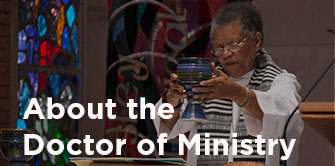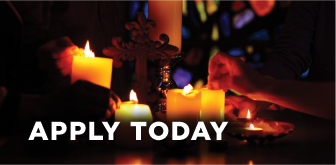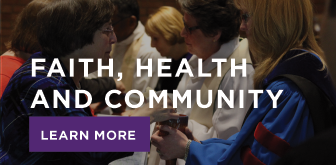Canon Dr. Michael Boney: "I needed to be at Wesley to really learn how to be an informed theologian.”
Five years ago, Canon Dr. Michael Boney, director of music at Christ Church Cathedral in Indianapolis, Ind., was looking to broaden his horizons. With both a bachelor and master’s degree in music already, he knew he was searching for something different.
“The important part for me wasn’t to get a lot of music education, because I already had that,” he said. “I wanted the complete opposite – a theological degree.” At the recommendation of his best friend and fellow Wesley graduate, he applied to Wesley’s Doctor of Ministry program in the “Arts and Theology” track.
Once in the program, Boney’s (DMin, 2015) cohort explored the fundamental question of whether the arts inform theology, or theology informs the arts. The group determined that the arts inform theology, an idea that became foundational to the rest of Boney’s coursework.
“The arts, whether music, poetry, drama, all of that, takes theology and turns it into something palpable, something that people can connect with,” he said.
Throughout his three-year program, Boney most appreciated his project seminar, which was his final class.
“That was probably the most important class I took because it allowed me to hone in on what my dissertation would be,” Boney said. His dissertation focused on the importance and significance of organ improvisation in the Anglican worship tradition. Boney still incorporates the ideas in his dissertation into his work at Christ Church Cathedral, which is a congregation of the Episcopal Church.
“I’m constantly using those ideas, and not just on the keyboard side,” he said. “One has to think theologically and aesthetically about what would fit in the moment in the service. Whatever is happening theologically and scripturally is then interpreted musically through improvisation.”
For Boney, coming to seminary for a Doctor of Ministry was a natural next step in his career as a church musician, even though he had not completed a Master of Divinity.
“Theological seminaries really need more church musicians in them,” he said. “Next to the priest, we have more to do with the liturgy than anyone else. I needed to be at Wesley to really learn how to be an informed theologian.”
Connecting the bridge between clergypersons and church musicians is something Boney is passionate about. That is part of the reason he chose to study at Wesley.
“I think if you’re going to be an effective church musician or an effective clergyperson, then you’ve got to understand at least a little bit about the other side,” he said. “That enriches the liturgy. There can’t be a divide. Otherwise, you get people who just come to church to hear the sermon and others who come just to hear the music, and yet, both are the liturgy.”
Boney’s experiences at Wesley helped identify his passion to bridge this divide and inform how he collaborates with clergy in his church work today. To those considering a degree in the “Arts and Theology” track, he has one piece of advice.
“Just do it,” he said. “Don’t worry if you’ve been to seminary or studied theology or not. Just fill out the application and let the seminary decide if you’re the kind of student they’re looking for. Don’t worry too much about it if it’s something you feel called to.”
Applications are now being accepted for a new “Arts and Theology” track, which will begin in January 2018. For more information and to apply, please visit here: https://www.wesleyseminary.edu/doctorofministry/arts-and-theology/.


![DMINUK [Replace with photo for Directions page]](https://www.wesleyseminary.edu/wp-content/uploads/2015/06/DMINUK.png)

